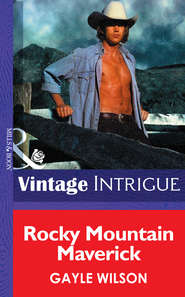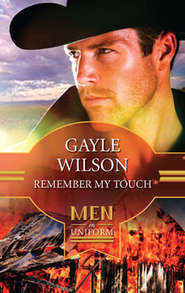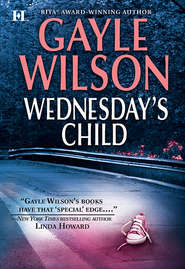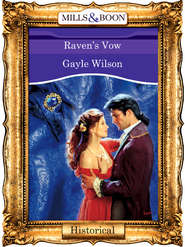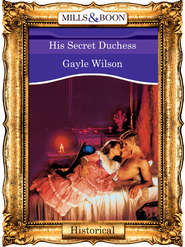По всем вопросам обращайтесь на: info@litportal.ru
(©) 2003-2024.
✖
The Cowboy's Secret Son
Автор
Год написания книги
2019
Настройки чтения
Размер шрифта
Высота строк
Поля
Although the doctors had put his dad’s death down to a stroke, Mark knew that bitterness and failure had played as big a role as his physical condition. A longtime widower, deeply estranged from Mark, who was his only child, Bo Peterson had died a lonely and sour old man. And if he wasn’t careful, Mark told himself, coming in now over the ranch that had killed his father, that could be his own epitaph as well.
In contrast to the old Salvini place, the buildings below showed the effects of having enough money. There were only a few hands, including himself, living on the ranch now that the fall roundup was over, but it still had the well cared for air that all of the co-op’s properties possessed.
He wondered how his father would have felt about that. He sometimes wondered how he himself felt about it.
He set the chopper down with the ease of long practice. Even after he had completed the shutdown procedures, he remained in the comfortable warmth of the enclosed cockpit, delaying a moment because he dreaded the bite of the November wind, despite the protection of the leather jacket he wore.
There was nowhere in Texas as prone to bitter cold as the top of the Panhandle. The frigid gusts from the north swept ruthlessly across the flat landscape, chilling to the bone.
And his bones were a lot more susceptible than they had been before he’d left here ten years ago, Mark acknowledged. He remembered the pleasure he had once taken in a long day of hard physical labor or in the equally demanding leisure pastimes.
It had been a long time since he’d wrestled a steer or done any saddle bronc riding. And, he admitted ruefully, his lips quirking slightly, it would be a hell of a long time before he did either again.
He climbed out, feeling the jolt of the short step to the ground in every one of the damaged vertebrae of his spine. He gritted his teeth against the pain, trying to stretch out his back unobtrusively as he walked away from the chopper.
Too many hours in the cockpit without a break. He wasn’t making any complaints, though. Flying was the only activity he had ever found that he loved with the same passion he had once felt for rodeoing. He had been strictly an amateur, not nearly on a level to go pro, but he had been good enough to win some of the local prizes.
And good enough to win a few admiring glances from the women and slaps on the back from the men of the close-knit ranching communities of the Panhandle. Those had meant more to him than the money or trophies he’d won.
Especially at the last, when some of those glances had come from the doe-brown eyes of the once skinny little girl who had tagged along at his heels, hero-worshiping him the whole time they’d been growing up. Tagged along until in the space of one year, while he’d been away at college, Jillian Salvini had become a woman. A woman he’d seen with newly awakened eyes and fallen head over heels in love with.
“Back mighty late, boy,” Stumpy Winters yelled from the door of the bunkhouse. “Boss been calling you. He said for you to be sure and give him a ring when you get up to the house.”
Mark waved an acknowledgment to the old man, hunching his shoulders against a blast of wind that carried with it a stinging assault of dirt. Most nights he stopped at the bunkhouse to talk, delaying the lonely hours he would spend in his father’s house until it was time for bed. Tonight he needed to take a hot shower and stretch out his aching back more than he needed company.
Stumpy wouldn’t be offended. The old man had known him from the time he had ridden his first horse. Actually, he wasn’t sure Winters hadn’t been the one who’d put him up on that swayback.
Out of sight of the bunkhouse now, Mark slowed his pace, stretching his spine again. He climbed the three steps that led to the ranch house’s back stoop as if he were as old as Stumpy.
Once inside, he shut the door, blocking out the howl of the wind. Closing his eyes, he leaned back in relief against the solid wood behind him.
After a moment he straightened and walked across the kitchen, boot heels echoing on the vinyl-covered floor. He filled the glass standing beside the old-fashioned enamel sink and drank down the same clear, sweet well water of his childhood in a couple of long thirsty drafts. As he stood there drinking his water, he noticed that the shadows were beginning to lengthen over the yard, revealed through the windows above the sink.
He wondered idly what Tom Shipley wanted. Probably instructions about another errand to be run tomorrow. That was mostly what the chopper was used for during periods when cattle weren’t being moved. Bringing in supplies and shuttling guests from the airports in Amarillo and Lubbock out to the spread the co-op ran as a dude ranch. Or taking its owners, like Shipley, into market or meetings. Occasionally doing medevac duties for the few injuries that required more than the first aid available on the ranches themselves.
He put down the glass and turned to face the phone on the opposite wall. Make the call, get squared away with Shipley, and then grab a hot shower, he promised himself, imagining the heat relaxing muscles tensed by a long day in the air.
Maybe tensed even further by that little side trip into the past he took every time he flew over the Salvini place. Tensed every time he thought about Jillian. Which had been too often lately for his peace of mind. Especially since he’d come home.
Home, he thought, glancing around his mother’s kitchen. Not all that much had changed about it since she’d died. Just over twenty years ago, he realized with a small sense of disbelief.
There was a different color of paint on the walls. New curtains on the windows he’d been looking out. But the scarred wooden table and four chairs were exactly the same. He could still remember the night he’d brought Jillian here so they could tell his dad—
He stopped the playback of that image, closing his eyes against the painful strength of it. Too damn many memories. Too many ghosts. And none of them, except maybe his mother’s, would rest easy with him living here. He pushed away from the counter and walked over to the phone.
After he’d dialed Shipley’s number, he stood listening to the distant ringing, his eyes once more considering the chair where Jillian had sat that night. When he realized what he was doing, he turned around, facing the wall instead. And he knew that action was a physical enactment of what he needed to do mentally. To turn his back on the past.
He had been here long enough to know that coming home had been a mistake. It was time to start looking for another job. Time to move on. Time to forget about what had happened here and to get on with the rest of his life.
After all, he thought, the bitterness surging relentlessly to the surface again, that’s exactly what she had done. Jillian Salvini had turned her back on him and everything that had been between them. In doing that, she had been wiser than he. Apparently Jillian had known, even then, that no matter how badly you might want to, you could never really go home again.
* * *
“VIOLET,” Jillian Sullivan said. “Oh, God, not Violet.”
She touched the edge of her desk and, using it for support, eased down into her chair like someone who had suffered a hard blow to the midsection. Which was exactly what this felt like.
“I’m really sorry to be the bearer of such bad news,” the man who had introduced himself as Dylan Garrett said.
Jillian forced herself to look up, taking a calming breath as she nodded. “I didn’t know. I didn’t have any idea. I should have, I suppose. I had written her a couple of times and gotten no reply, which for Violet was so far from the norm…”
She shook her head, moving it slowly from side to side as she tried to assimilate the unwanted information that Violet Mitchum was dead. More unwanted than it would have been had they not had that silly argument the last time they’d met.
That was what those two letters had been about—an attempt to reassure Violet that she really did know what she was doing as far as marrying Jake Tyler was concerned. And as far as Drew was concerned as well, Jillian conceded.
That was what had eroded her confidence in her decision the most—Violet’s doubts about whether or not Jillian was doing the right thing for her son. The question of whether she was cheating him out of something that he was entitled to. And yet, one of the reasons she had agreed to marry Jake—
“Mrs. Sullivan?”
Dylan Garrett’s voice brought her back to the present, a present she was still having a hard time facing.
“I’m sorry,” she said blankly. “What did you say?”
“I was wondering if you had known Violet Mitchum long.”
Long enough to feel for her the kind of love usually reserved for family, Jillian thought. She didn’t say it aloud, but there was no doubt the old woman had assumed a parental role in her life. And therefore the loss was almost as devastating as if she had been one of Jillian’s parents.
Maybe even more so, she realized in regret. After she had left her family and ended up in Pinto, Jillian had desperately needed someone as supportive as Violet in her life. And through the years, she couldn’t have asked for a better friend.
“More than nine years. She was both a friend and a mentor.”
“A mentor?”
“She taught me a lot of what I know about this business,” Jillian said, glancing around the interior design studio. “When I came to Pinto, the only job I could get was in the local antique store. I learned a lot from the owner, who was a friend of Violet’s, but even more from Violet herself. Despite the rather…unusual appearance of her house, she had collected some really lovely things when she and Charlie traveled. Violet might not have had any formal education, but she had the eye, and the instinct, to discern quality and value.”
“And she shared those with you?”
Jillian smiled at him, thinking about all Violet had shared through the years. “That and far more. She paid for my classes in design and baby-sat my son so I could attend them. When I finished school, she helped secure this job for me by contacting a friend of hers who lived here in Fort Worth. I owe her more than I could possibly say, and now I discover that she’s gone, that she’s been dead for over a month. And I didn’t even know.”
Despite the depth of her grief, Jillian hated the catch in her voice when she spoke. Through the years she had learned the hard lesson of hiding her emotions. At first she had done it out of pride, and a determination that no matter what her father said to her, he would never see her cry. Then she had done it for Drew’s sake, keeping up a brave front for her son, despite the struggle those first years had been.
By now, guarding her feelings was a deeply ingrained habit. One that even a grief this profound apparently couldn’t break.
“I’m so sorry,” Dylan said again.
“Thank you. It’s just…such a shock.”
“And I have what will probably be another for you.”






